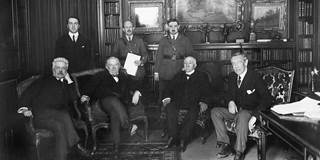Exactly 100 years after the start of the Paris peace process that formalized the end of World War I, the world is at a historical crossroads again. As in 1919, the temptation to pursue more democracy and deeper international cooperation must be managed carefully, lest tragic unintended consequences follow.
PRINCETON – It has now been just over 100 years since the opening of the Paris Peace Conference, which produced the Treaties of Versailles, Saint-Germain-en-Laye, Neuilly-sur-Seine, Trianon, and Sèvres, bringing an end to World War I. To this day, resentment over the Treaty of Trianon fuels Hungarian nationalism and revisionism, particularly under the current government of Prime Minister Viktor Orbán.

PRINCETON – It has now been just over 100 years since the opening of the Paris Peace Conference, which produced the Treaties of Versailles, Saint-Germain-en-Laye, Neuilly-sur-Seine, Trianon, and Sèvres, bringing an end to World War I. To this day, resentment over the Treaty of Trianon fuels Hungarian nationalism and revisionism, particularly under the current government of Prime Minister Viktor Orbán.